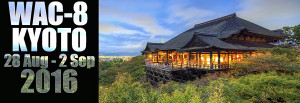WETLAND SESSION TITLE: Multiproxy Wetland and Lakeside Archaeology: From Constructed Niches to the Anthropocene
Organiser(s): Tony Brown (University of Southampton / UK), Naoto Yamamoto (Nagoya University / Japan) and Hidetaka Bessho (Higashiosaka City Cultural Foundation / Japan)
Type: Symposium
Contact: Tony.Brown@soton.ac.uk
Website link: http://wac8.org/academic-program/accepted-sessions-2/ast10/#t10l
Deadline for paper submission; end of February 2016
Abstract: Archaeological sites in wetlands and lake environments have revealed remarkable aspects of the human past that are out of reach of typical dry-land archaeology. The increasing sophistication of palaeoecological methods from biomarkers to aDNA is also producing remarkable data on human activities from lakes and wetland sites. These environmental archives can also record in unparalleled detail the slow and non-linear transition from human co-habited niches to the ecological dominance that characterises the Anthropocene. Whilst the excavation of wetland sites started in NW Europe, especially on the famous lake villages of Switzerland, it has now expanded worldwide to southern Europe, North America, and even Africa. One of the geographical areas of greatest potential is SE Asia including Japan, where excavations of Jomon sites have revealed both remarkable, but also important, details of past human lives and their relationship to changing environmental conditions. Because of the exceptional importance of environmental data to wetland archaeology its study has always been closely related to palaeoecology and this session will exploit this Ecology-Archaeology synergy. In this session, jointly convened by European and Japanese environmental archaeologists we will address how studies of wetland sites (wetlands and lakes) can contribute to studies of Holocene hunter gatherer lifestyles including plant and animal husbandry, to the history of agriculture worldwide and the relative importance of environmental change at a variety of scales from the short-lived and local ‘events’ to global trends.
Dear Committee. I hope this session will bring together European, American and Japanese archaeologists all interested in the use of palaeoecological and environmental data from wet sites. We aim to go far beyond traditional notions of palaeodiet and life-ways through nutritional analyses, aDNA and modelling.
Keywords: wetlands, lakes, Jomon, palaeodiet, nutrition

Leave a Reply